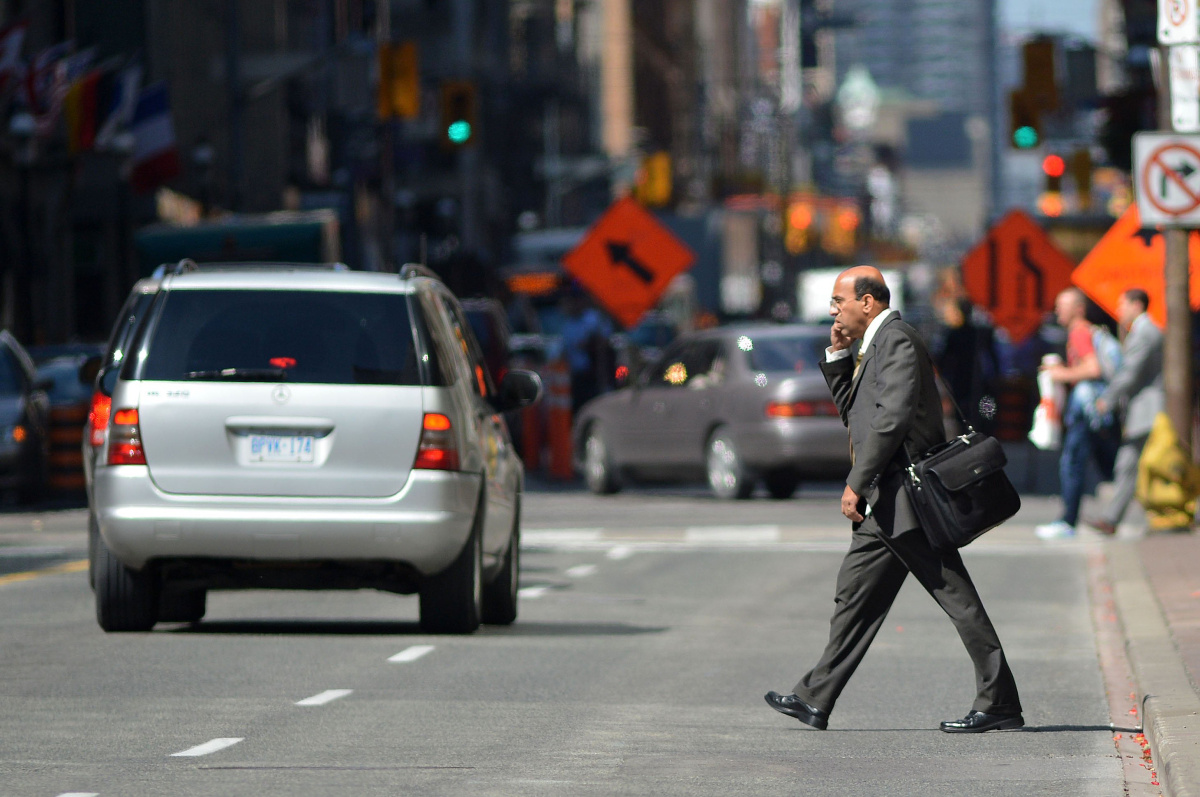Halifax is in the grips of a terrible crime wave, or so the Nova Scotia Legislature seems to believe. Last month it voted for a dramatic increase in fines for a certain offence in order to punish Haligonians—yes, that’s really what they’re called—for their criminal ways. But the targets of these stiff new penalties are not who you would expect. They’re not gangsters, drug dealers, or even drunk drivers—they’re jaywalkers.
Thanks to a recent bill passed by the Nova Scotia government, jaywalking could now be punishable by a fine of $697.50, with additional penalties of $1,272 and $2,422 for subsequent offences. The hefty fines are part of the province’s effort to reduce the number of collisions and pedestrian injuries on Halifax roads.
While the bold move has no direct impact on McGillians—except those who may be heading home to Nova Scotia in the summer—the idea that jaywalking fines could be increased to almost $700 in a Canadian city should be terrifying to Montreal residents. If jaywalking is really a crime, then the average Montrealer is on par with Al Capone. But hopefully, if Montreal city officials have even an ounce of common sense, $700 jaywalking tickets will never become a reality in the city.
As critics of the bill have pointed out, the new fines are completely disproportionate to the gravity of the offence, especially in light of the fines levied for other road-related offences. Raising the jaywalking fine to almost $700 makes it higher than fines for much more dangerous conduct, including drunk driving, texting and driving, and driving 30 km/h over the speed limit in a school zone. Jaywalking can be perilous and therefore merits a ticket, but imposing fines bigger than those for much more dangerous offences distorts the incentives for perpetrators.
The bill raises the issue of whether higher fines are an effective deterrent at all. The logic of the province’s Legislature rests on the flimsy assumption that pedestrians are generally aware of how much a jaywalking ticket will cost them, and will adjust their behaviour accordingly. Unless the issue makes headlines, as Nova Scotia’s exorbitant fine has managed to, most pedestrians are likely to be unaware of how much a jaywalking ticket costs. In Montreal, the fine is a modest $15; in Toronto, it can vary from $35 to $90. But unless that information is common knowledge, it’s unlikely to have an effect on pedestrian behaviour in either city.
Such a steep fine will also undoubtedly make the police hesitant to give out tickets, as jaywalking is a petty infraction. In this case, the punishment is disproportionate to the harm of the crime. This would be especially troublesome in Montreal: This city’s cops already wear camouflage pants and decorate their squad cars with more stickers than a first grader’s spelling quiz. Handing out $700 jaywalking tickets is one of the few things that could make people take them even less seriously.
Moreover, deterring jaywalkers can be achieved in much more effective ways. In 2010, when the Toronto Police Service wanted to change pedestrian attitudes toward the offence, they focused on increased enforcement of the existing fine. The police cited enforcement and awareness of existing laws as the keys to deterring dangerous pedestrian practices, and to great effect.
Tighter enforcement of jaywalking laws is a much more effective deterrent than exorbitant fines because it better addresses the philosophy behind jaywalking. What makes jaywalking a daily occurrence around Montreal isn’t the lack of a large fine, it’s the minimal risk of getting caught. Jaywalking is like internet piracy: You don’t download 10 episodes of Game of Thrones because you think the penalty for piracy is too lenient; you do it because you’re confident the Royal Canadian Mounted Police won’t show up at your door to drag you off to wherever Canadian Guantanamo is (Winnipeg?).
Increased road safety is an important goal, and one which will benefit pedestrians and motorists alike. But when cities like Halifax or Montreal attempt to address the issue of jaywalking, they should stick to methods that have proven effective—like increased enforcement—and steer clear of exorbitant fines. Students certainly don’t need $700 jaywalking fines here: After all, if a McGill student really wants to be arbitrarily charged $700, they’re always welcome to buy a Canada Goose jacket, get the latest iPhone, or head down to the bookstore for a textbook or two.










